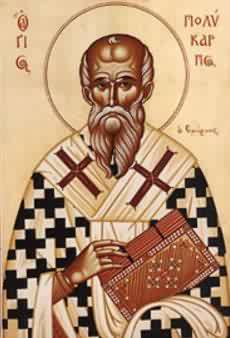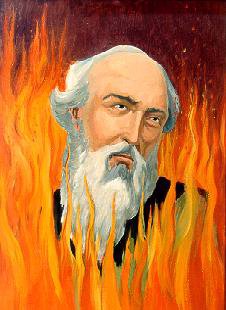
Polycarp was born around 70 A.D. He was sold as a slave in his childhood to a wealthy woman named Calisto. She reared him as her son. He came to know Christ as his Savior in those early years. As he grew older, he had the opportunity to study under and actually be discipled by the Apostle John who had personally sat under the teaching of Jesus Christ! Think about that! Polycarp was actively involved in serving the Lord in the Church of Smyrna. Upon the death of Calisto he became heir to all of her estate. He used his inheritance to advance the cause of Christ and to help those who were in need. When Pastor Bucolos died the Apostles and particularly the Apostle John appointed Polycarp to be the Pastor of the Church of Smyrna. Polycarp faithfully ministered in that church for many years.
Persecution of Christians was the order of the day when Marcus Aurelius was the Emporer of Rome (161-180). For many years Polycarp was spared. But, the full force of persecution was unleashed on Polycarp in the later years of his ministry. Three days before he was arrested the Lord revealed to him in a dream that he would be burned at the stake. When the soldiers came to get him, his friends insisted on hiding him. Soon the soldiers discovered where he had been taken. When he saw them coming, he went out and greeted them warmly and offered them food. As they were eating, he requested that he be allowed to pray before they took him away. His request was granted. For two hours he prayed fervently out loud and said, "inasmuch that many of the soldiers began to repent, that they were come out against so godly an old man."
When he was done praying they set him on a donkey and took him into the city to be tried as one who was an adversary of the authorized pagan religion. When he arrived, they sat him in a chariot and began to urge him to say the Caesar was God and offer a sacrifice to him. They asked him, "there is no harm in that is there?" At first he refused to answer. Finally, after they continued to press him Polycarp said, "I shall not do what you would persuade me to."
This made his judges angry. Very angry. They had confidently supposed that they would be able to easily persuade him to do what they wanted him to do. They became vicious in their words and actions. They literally threw him out of the chariot he had been sitting in, which caused serious injury to his thigh. This display of force incited the blood thirsty mob to the point that they were so loud in their curses and jeers that no one could hear. As they were dragging Polycarp to the place of execution, it is said that a voice rang out from Heaven loud and clear, above the riotous crowd which said, "Be strong, Polycarp, and quit thyself like a man." [The phrase "quit thyself" means, to carry through, or perform to the end. Hence, be strong and stand like a man to the end.] The record states that while no one saw who it was that spoke to Polycarp, many of the believers who were in the crowd clearly heard the voice also.
To be sure, Polycarp stood for the Lord Jesus Christ to the end, despite all the efforts to persuade him to renounce Christ. One of the judges tried to get him to deny his faith by saying, "Reverence thy old age…Swear by Casear's Fortune. Repent, and say; Take away the Wicked." Historians say, "Polycarp, looking with a stern countenance upon the whole multitude of wicked Gentiles, that was gathered together in the Lifts, and shaking his hand at them, looked up to Heaven, and groaning said, 'Take away the Wicked'." But the judge was not satisfied with this. He said, "Sware, and I will set thee at liberty; reproach Christ."
It is at this point that Polycarp gives his famous response --
"Eighty and six years have I now served Christ, and he has never done me the least wrong: How then can I blaspheme my King and my Savior?"
The judge then angrily urges him to, "swear by the Genius of Caesar." Polycarp refuses, but offered to share with him his faith in Jesus Christ. The judge absolutely rejected the offer and threatened, "I have wild beasts ready, to those I will cast thee except thou repent." Polycarp responds calmly, "Call for them then: For we Christians are fixed in our minds not to change from good to evil; But for me it will be good to be changed from Evil, to Good." The furious judge said, "Seeing that thou dispiseth the Wild Beasts, I will cause thee to be devoured by Fire, unless thou shall repent." Polycarp answered, "Thou threatenest me with Fire which burns for an hour, and so is extinguished; but knowest not the Fire of the Future Judgment, and of that Eternal Punishment, which is reserved for the Ungodly? But why tarriest thou? Bring forth what thou wilt!"
The judge loudly cried out three times, "Polycarp has confessed himself to be a Christian." The mob responded in fury, "This is the Doctor of Asia; The Father of the Christians; an the overthrower of our gods. He that has taught so many not to sacrifice, nor pay any worship to the gods." At first they cried out that the lions should be loosed on him and then that he should be burned alive.
They took Polycarp to the stake and were going to nail him there. He spoke up and said, "Let me alone as I am: For he who has given me strength to endure the Fire, will also enable me, without your securing me by nails, to stand without moving in the pile." The merely tied him to the stake.
He prayed this prayer before the fire was was kindled --
Lord God Almighty, the Father of thy Well-beloved, and Blessed Son, Jesus Christ, by whom we have received Knowledge of thee; the God of Angels and Powers, and of every Creature, and especially the whole Race of Just Men who live in thy presence! I give thee hearty thanks that thou hast vouchsafed (allowed) to bring me to this Day, and to this Hour; that I should have a part in the Number of thy Martyrs, in the Cup of thy Christ, to the Resurrection of Eternal Life, both of Soul and Body, in the Incorruption of the Holy Ghost. Among which may I be accepted this Day before thee, as a fat and acceptable Sacrifice; as thou the true God, with who is no falsehood, has both before ordained, and manifested unto me, and also hath now fulfilled it. For this, and for all things else, I praise thee, I bless thee, I glorify thee by the Eternal, and Heavenly High Priest, Jesus Christ they Beloved Son; whit whom to Thee and the Holy Ghost, be Glory both now, and to all succeeding Ages, AMEN.
Upon the "AMEN" the executioner lit the fire, but something strange happened. It is said that the flames arched around Polycarp like a sail of a ship filled with wind and he would not burn. After some time, the command was given to the executioner to stab him with a sword, so he did. The result was that, it is said, so much blood flowed from the wound that it extinguished the fire. The fire was rekindled and Polycarps body was burned to as hes. Polycarp was faithful to the Lord unto death. And it is interesting to note that the congregation of the Church of Smyrna believed that the Apostle John, under the inspiration of the Holy Spirit, penned Revelation 2:8-10 with their pastor, Polycarp, prophetically in mind. Rev 2:8 “To the angel of the church in Smyrna write: These are the words of him who is the First and the Last, who died and came to life again. 9 I know your afflictions and your poverty—yet you are rich! I know the slander of those who say they are Jews and are not, but are a synagogue of Satan. 10 Do not be afraid of what you are about to suffer. I tell you, the devil will put some of you in prison to test you, and you will suffer persecution for ten days. Be faithful, even to the point of death, and I will give you the crown of life. John wrote Revelation sometime between 65 A.D and 96 A.D. and Polycarp was martyred in about 168 A.D.
hes. Polycarp was faithful to the Lord unto death. And it is interesting to note that the congregation of the Church of Smyrna believed that the Apostle John, under the inspiration of the Holy Spirit, penned Revelation 2:8-10 with their pastor, Polycarp, prophetically in mind. Rev 2:8 “To the angel of the church in Smyrna write: These are the words of him who is the First and the Last, who died and came to life again. 9 I know your afflictions and your poverty—yet you are rich! I know the slander of those who say they are Jews and are not, but are a synagogue of Satan. 10 Do not be afraid of what you are about to suffer. I tell you, the devil will put some of you in prison to test you, and you will suffer persecution for ten days. Be faithful, even to the point of death, and I will give you the crown of life. John wrote Revelation sometime between 65 A.D and 96 A.D. and Polycarp was martyred in about 168 A.D.
Saturday, August 26, 2006
Subscribe to:
Post Comments (Atom)




1 comment:
Good subject! I enjoy biographical articles, especially those of faithful
Christians of the past.
One thing though, I thought I read in Eusebuis's Ecclesiastical History (c.
325 A.D.) that Polycarp was martyred in Rome approx. 155 A.D.?? Do you have
other sources that say it was later?
Post a Comment